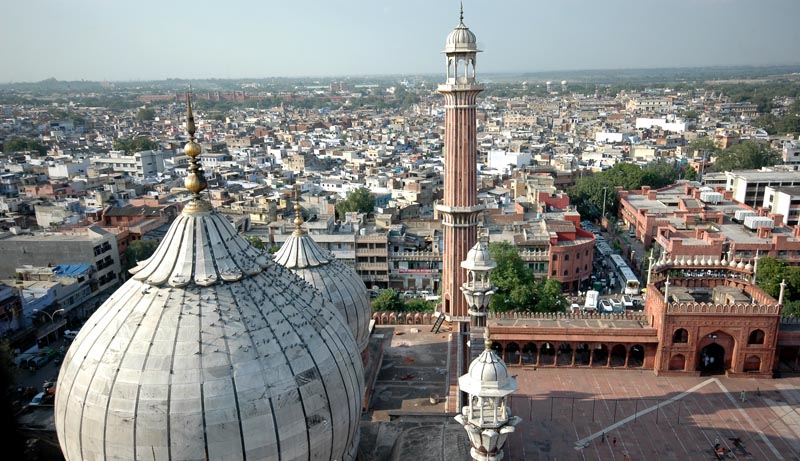Shah Waliullah Library: A Small But Powerful Effort To Promote Education In The Walled City Of Delhi
CHAHAT RANA

An outsider might find the bustling narrow roads behind old Delhi’s Jama Masjid charming, but Mr. Mohammed Naeem, President of the Delhi Youth Welfare Association (DYWA), breaks this illusion by shedding light on the grim reality of those residing here and the apathetic attitude of the administration.
“Two trucks can pass on the same road, where individuals have to squeeze through now”. “Recently,” he continues, “when there was a marriage at Bukhari (Imam of Jama Masjid) Saheb’s place, the police cleaned it till it sparkled.” Mr. Naeem suggests that the administration doesn’t want to aid any sort of development in the area otherwise. “In the last 25-30 years, I have seen no change here!” He explains fervently.
Decked up street behind Jama Masjid
Indeed, there is a pervading sense of stagnancy in the area. We traverse the lanes of Urdu Bazaar amidst Ramadan Festivities to reach the narrow street of Chooriwalan. Google maps fails where local hospitality successfully aids our navigation. Dodging hand drawn carts, rickshaws, shops and vendors encroaching onto the road, we reach the entrance of a small lane next to a bright pink mosque door. A man sitting outside a meat shop beckons us like he already knows where we are headed. He guides us to a tiny entrance in the middle of the snaking street.
Chooriwalan, outside the lane that leads to Shah Waliullah Library
The entrance opens up to an even tinier room. Three men sit reading newspapers around a table in the middle of the room. The walls are covered with shelves and stacks of books. This is Shah Waliullah Library, a community library containing about 15000 books in Arabic, Persian, Urdu and even Hindi.
Inside Shah Waliullah Library
“You should have called me, then I could have dedicated more time to you.” Says Mr Naeem as we sit down to talk to him. They offer us a cold bottle of water and we gulp away as the fasting men sit around us patiently. “It is ok. We feel even more strength when people eat or drink around us during our Roze.” says another member of DYWA, as the realization of our religious insensitivity dawns upon us.
Naeem tells us about the history of his NGO. He, along with a few of his friends came up with the idea during a four-day long curfew placed to ease communal tensions at Old Delhi in 1987. “We saw people suffering without any supplies on the streets. After the curfew ended, we brought food supplies for these people and realized that indeed, there is a need for positive change in the community.” Many such social efforts were made by Naeem and his friends till they officially established the NGO in 1990.
“We provide extra classes for children around here, supply books, give free counselling and even apply to colleges and often pay their fees.” continues Naeem. The library stemmed from the idea of education as the means to achieve social development in the area. “It started with our own personal donations, and now many people have started donating books.”
The oldest books at the library is a six-hundred-year old Arabic book on logic. The most fascinating of all, is a book of poetry written by Bahadur Shah Zafar, printed in the Red Fort in the presence of the last Mughal King. “The most intriguing fact is that by the end of this book, he started writing poetry in Punjabi.” says Naeem, eyes glazed with wonder.
Digital copy of Bahadur Shah Zafar’s poetry
The fascination is infectious. As we quickly skim through the digital copies of these ancient and rare manuscripts, I inquire whether we can see the originals. “For now, they are wrapped in those white covers. Until we find more space to display them in a safer environment, we might have to leave them wrapped in paper.” Except for a team sent by the Ministry of Culture who wrapped the older books in thick white paper; no efforts have been made or assistance offered to preserve the treasure trove of books at the library.
“So many people have come here. They know about the significance of these books. Even Mr Kapil Sibal visited the place. All we need is some space to keep these books properly. That has not been granted to us;” continues Naeem somberly.
Space seems to be the biggest obstacle in this congested locality of Old Delhi. “If we have space, we can even start Urdu classes here. More people, more children with scholarships can come for research. This place is a rare resource.” Yet no effort has been made to acknowledge, preserve or even utilize this cultural resource. “Even if we let governmental authority take over the library, what will they do? Go and look at the state of the Urdu Institute, books are rotting in sacks there.” Naeem delivers passionately.
He offers a revealing anecdote regarding the historical ignorance of the administration. This is about the recent discovery of the 17th century Akabarabadi Masjid while building the Delhi metro heritage line. “We had told them that such a mosque exists about ten years ago and they paid no attention. Now they are celebrating this so called discovery.” He chuckles to himself.
As we prepare to leave, two chilled cartons of Frooti are handed to us by the ever smiling custodian of the library, and member of DYWA: Mr. Shareef Quraishi. As we thank them for their generosity, they dismiss our greetings, suggesting that “these small good deeds and discussions are all that make a difference. You keep making your own efforts and we will continue to make ours.”
Mr Shareef, the caretaker of the library talking on the phone



